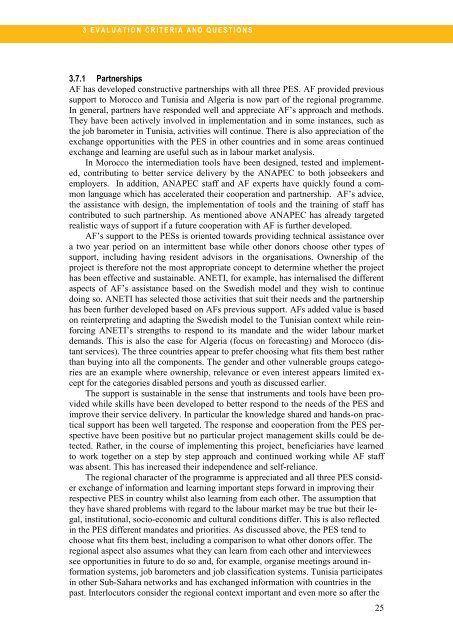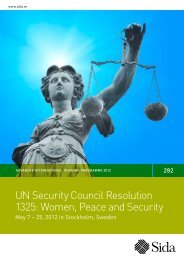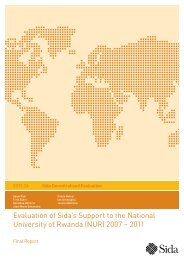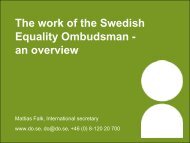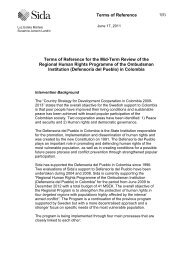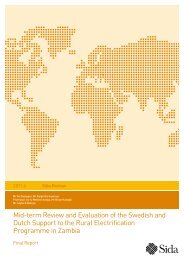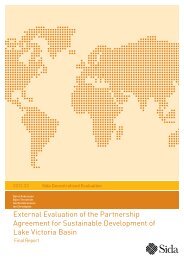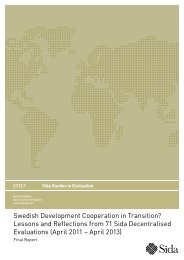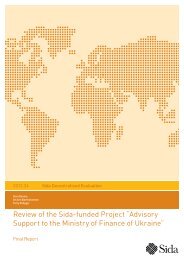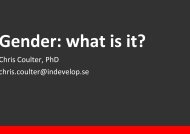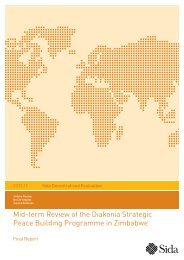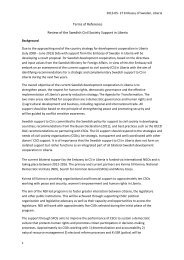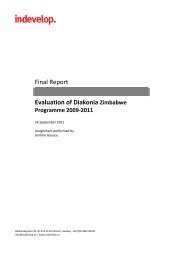Evaluation of the Maghreb Regional Training Programme - Indevelop
Evaluation of the Maghreb Regional Training Programme - Indevelop
Evaluation of the Maghreb Regional Training Programme - Indevelop
You also want an ePaper? Increase the reach of your titles
YUMPU automatically turns print PDFs into web optimized ePapers that Google loves.
e<br />
3 E V A L U A T I O N C R I T E R I A A N D Q U E S T I O N S<br />
3.7.1 Partnerships<br />
AF has developed constructive partnerships with all three PES. AF provided previous<br />
support to Morocco and Tunisia and Algeria is now part <strong>of</strong> <strong>the</strong> regional programme.<br />
In general, partners have responded well and appreciate AF’s approach and methods.<br />
They have been actively involved in implementation and in some instances, such as<br />
<strong>the</strong> job barometer in Tunisia, activities will continue. There is also appreciation <strong>of</strong> <strong>the</strong><br />
exchange opportunities with <strong>the</strong> PES in o<strong>the</strong>r countries and in some areas continued<br />
exchange and learning are useful such as in labour market analysis.<br />
In Morocco <strong>the</strong> intermediation tools have been designed, tested and implemented,<br />
contributing to better service delivery by <strong>the</strong> ANAPEC to both jobseekers and<br />
employers. In addition, ANAPEC staff and AF experts have quickly found a common<br />
language which has accelerated <strong>the</strong>ir cooperation and partnership. AF’s advice,<br />
<strong>the</strong> assistance with design, <strong>the</strong> implementation <strong>of</strong> tools and <strong>the</strong> training <strong>of</strong> staff has<br />
contributed to such partnership. As mentioned above ANAPEC has already targeted<br />
realistic ways <strong>of</strong> support if a future cooperation with AF is fur<strong>the</strong>r developed.<br />
AF’s support to <strong>the</strong> PESs is oriented towards providing technical assistance over<br />
a two year period on an intermittent base while o<strong>the</strong>r donors choose o<strong>the</strong>r types <strong>of</strong><br />
support, including having resident advisors in <strong>the</strong> organisations. Ownership <strong>of</strong> <strong>the</strong><br />
project is <strong>the</strong>refore not <strong>the</strong> most appropriate concept to determine whe<strong>the</strong>r <strong>the</strong> project<br />
has been effective and sustainable. ANETI, for example, has internalised <strong>the</strong> different<br />
aspects <strong>of</strong> AF’s assistance based on <strong>the</strong> Swedish model and <strong>the</strong>y wish to continue<br />
doing so. ANETI has selected those activities that suit <strong>the</strong>ir needs and <strong>the</strong> partnership<br />
has been fur<strong>the</strong>r developed based on AFs previous support. AFs added value is based<br />
on reinterpreting and adapting <strong>the</strong> Swedish model to <strong>the</strong> Tunisian context while reinforcing<br />
ANETI’s strengths to respond to its mandate and <strong>the</strong> wider labour market<br />
demands. This is also <strong>the</strong> case for Algeria (focus on forecasting) and Morocco (distant<br />
services). The three countries appear to prefer choosing what fits <strong>the</strong>m best ra<strong>the</strong>r<br />
than buying into all <strong>the</strong> components. The gender and o<strong>the</strong>r vulnerable groups categories<br />
are an example where ownership, relevance or even interest appears limited except<br />
for <strong>the</strong> categories disabled persons and youth as discussed earlier.<br />
The support is sustainable in <strong>the</strong> sense that instruments and tools have been provided<br />
while skills have been developed to better respond to <strong>the</strong> needs <strong>of</strong> <strong>the</strong> PES and<br />
improve <strong>the</strong>ir service delivery. In particular <strong>the</strong> knowledge shared and hands-on practical<br />
support has been well targeted. The response and cooperation from <strong>the</strong> PES perspective<br />
have been positive but no particular project management skills could be detected.<br />
Ra<strong>the</strong>r, in <strong>the</strong> course <strong>of</strong> implementing this project, beneficiaries have learned<br />
to work toge<strong>the</strong>r on a step by step approach and continued working while AF staff<br />
was absent. This has increased <strong>the</strong>ir independence and self-reliance.<br />
The regional character <strong>of</strong> <strong>the</strong> programme is appreciated and all three PES consider<br />
exchange <strong>of</strong> information and learning important steps forward in improving <strong>the</strong>ir<br />
respective PES in country whilst also learning from each o<strong>the</strong>r. The assumption that<br />
<strong>the</strong>y have shared problems with regard to <strong>the</strong> labour market may be true but <strong>the</strong>ir legal,<br />
institutional, socio-economic and cultural conditions differ. This is also reflected<br />
in <strong>the</strong> PES different mandates and priorities. As discussed above, <strong>the</strong> PES tend to<br />
choose what fits <strong>the</strong>m best, including a comparison to what o<strong>the</strong>r donors <strong>of</strong>fer. The<br />
regional aspect also assumes what <strong>the</strong>y can learn from each o<strong>the</strong>r and interviewees<br />
see opportunities in future to do so and, for example, organise meetings around information<br />
systems, job barometers and job classification systems. Tunisia participates<br />
in o<strong>the</strong>r Sub-Sahara networks and has exchanged information with countries in <strong>the</strong><br />
past. Interlocutors consider <strong>the</strong> regional context important and even more so after <strong>the</strong><br />
25


